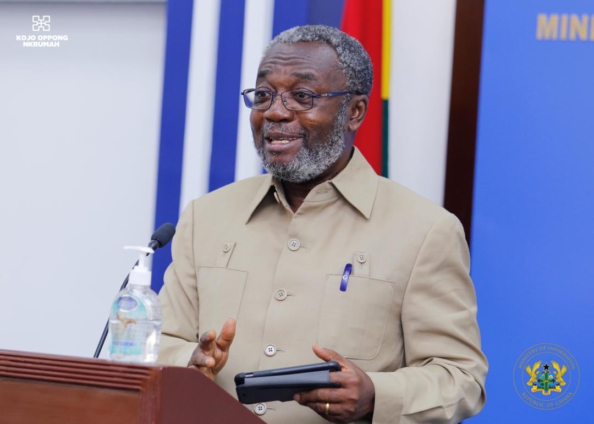The Presidential Advisor on Health, Dr Anthony Nsiah Asare, has outlined a series of measures aimed at addressing the high rate of emigration among Ghanaian health professionals.
Over the years, influential persons in the country including Okyenhene Osagyefo Amoatia Ofori-Panin have expressed concern over the rate of medical brain drain in Ghana.
In 2023 alone, about 4,000 nurses and midwives are said to have left the country for greener pastures.
This growing trend became the theme for the 43rd Annual General Meeting of the Society of Private Medical and Dental Practitioners (SPMDP) where it pledged to play a crucial role in reversing the brain drain in Ghana's health sector while calling on government to uphold its responsibility to retaining health workers.
Thus, speaking on Joy FM's Super Morning Show, Dr Asare noted that the government is working earnestly to eliminate the push factors while enhancing pull factors to retain talent within the country.
As such, he revealed that the government has removed fees for postgraduate studies for doctors as part of its efforts to streamline the system and make it more accessible.
“No doctor pays fees for postgraduate studies anymore. We have streamlined the postgraduate system to ensure that all the cumbersome processes that were making the procedure difficult for people who wanted to enroll at the Ghana Postgraduate College have been removed," he stated.
He also mentioned plans to increase the number of training sites across the country, which would decentralise the system and provide more opportunities for career progression.
Addressing the economic factors contributing to brain drain, Dr. Nsiah Asare highlighted the need to stabilise the foreign exchange rate, which would make earnings in the country more comparable to those abroad.
“Once the cedi-dollar exchange rate is contained, then that means whatever money you get here will be a bit comparable to the one received abroad," he noted.
In addition to these measures, Dr Nsiah Asare disclosed plans to collaborate with the private sector to provide accommodation for health professionals stationed at various facilities.
“We also think that there will be accommodation provided for anybody sent to any health facility. And for this, the government cannot do it alone; we would have to do it with the private sector.
“And I am happy to say that a lot of the private sector people are very interested in helping the government put up accommodation for doctors like it has been done for judges so that we would have a medical village wherever a hospital is situated.”
Latest Stories
-
If religion was a factor, I would’ve stepped aside – Dr Bawumia warns against tribal politics in NPP
25 minutes -
Okada rider survives brutal machete attack in Boinso, suspect arrested
29 minutes -
Photos: Asantehene graces son’s graduation at DPS International
2 hours -
Deputy Works and Housing Minister visits Ecobank-JoyNews Habitat Fair Clinic
3 hours -
Abdul Bashiru Hussein: The unseen spark lighting up Ghana’s football future
3 hours -
2025 FIFA Club World Cup: Is European supremacy a myth?
3 hours -
Brazil express interest in hosting 2029 FIFA Club World Cup
3 hours -
TCL hosts West Africa Regional launch in Accra, showcasing innovation and strengthening partnerships
3 hours -
Lecturer advocates mandatory teaching and military training for National Service Personnel
3 hours -
Hundreds of kids and coaches undergo Tennis training in Accra
3 hours -
‘We’ll always be available’ – Roger Smith commits to long-term support for Ghana Tennis
3 hours -
Ghana has enough fuel to last over 2 months – NPA boss
4 hours -
2 dead, three injured in building collapse at Kotokuraba’s London Bridge area
4 hours -
‘It is exciting’ -Tennis star Katrina Adams poised for clinic in Ghana
4 hours -
Nigeria: Five die as bomb explosion rocks Kano
4 hours

